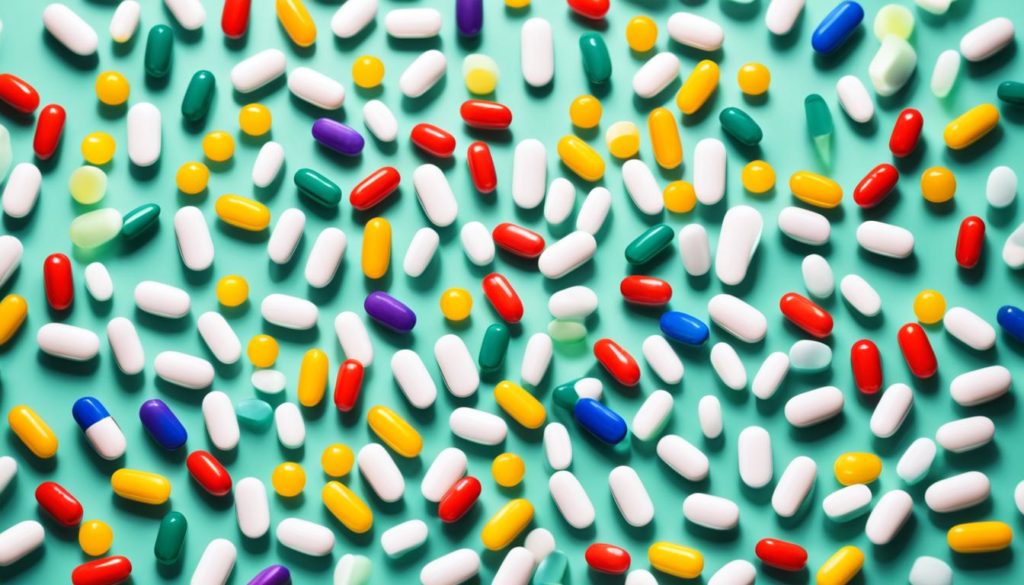Did you know nearly 50 million Americans deal with acne each year? It’s the top skin problem in the United States. More and more people are now using dietary supplements to fight acne naturally.
Vitamins that clear the skin are gaining popularity as acne fighters. Adding these supplements to your daily routine can help tackle acne’s root causes. This means you get clearer, healthier skin by treating your body from the inside out.
Key Takeaways
- Acne affects nearly 50 million Americans yearly, making it a prevalent concern.
- Dietary supplements offer a natural and effective alternative to pharmaceutical treatments.
- Incorporating clear skin supplements may help target acne from within.
- Vitamins with skin-clearing properties can significantly improve overall skin health.
- An increasing number of people are exploring natural acne solutions for holistic care.
Understanding Acne and Its Causes
Acne affects millions of people from all age groups. It shows up as pimples, blackheads, and cysts. It is not just a physical problem but can also hurt emotionally.
To manage and prevent acne, it’s key to know its causes. How your diet affects acne is also important. Choosing the right foods can help.
What is Acne?
Acne happens when hair follicles get blocked by oil and dead skin. It leads to whiteheads, blackheads, or pimples. These can pop up on your face, chest, and back.
The severity of acne varies. Without proper treatment, it may cause scars.
Common Causes of Acne
Hormonal changes, bacteria, oil production, and genetics play roles in causing acne. Puberty can increase oil in pores. This often leads to acne.
Bacteria named Propionibacterium acnes can infect these pores. This leads to pimples. If your family has a history of acne, you might too.
The Role of Diet in Acne Development
Research shows diet and acne are connected. Certain foods can affect your skin. High-glycemic foods and dairy may make acne worse.
Eating fruits, vegetables, lean proteins, and whole grains helps. These foods can keep your skin clear and healthy.

| Factor | Description |
|---|---|
| Hormonal Imbalances | Changes in hormones, particularly during puberty or menstrual cycles, boost oil production, leading to clogged pores. |
| Bacteria | Propionibacterium acnes infects clogged pores, causing inflammation and pimples. |
| Excess Oil Production | Overactive sebaceous glands produce too much oil, leading to clogged pores and acne flare-ups. |
| Genetics | Family history plays a significant role; if parents had acne, their children are more likely to develop it as well. |
| Diet | High-glycemic foods, dairy products, and unhealthy fats are linked to increased acne, while a diet rich in fruits, vegetables, and lean proteins supports clear skin. |
The Benefits of Using Supplements for Acne
Millions of people suffer from acne, seeking effective treatments. Supplements are gaining popularity as a solution for acne management. But what makes them worth considering?
Why Choose Supplements?
The best supplements for acne offer a natural way to fight acne, unlike traditional treatments. They’re easy to include in your everyday routine without changing your lifestyle much.
Supplements can help fix nutritional gaps that might worsen acne. By taking vitamins and minerals that boost skin health, you could see clearer skin and fewer breakouts.
More people are choosing natural health products, including supplements acne benefits, for their wellness and skin care. Their convenience and reported effectiveness make them a preferred choice.

Scientific Evidence Supporting Supplement Use for Acne
Research and studies back the acne supplement science. They show how some supplements can help manage acne symptoms. For instance, Omega-3 fatty acids have been found to lessen inflammation, a major cause of acne.
Zinc is vital for skin health, helping to reduce acne severity by controlling oil production and fighting bacteria. Vitamins A and E also help in skin repair and protection, making them great for acne treatment.
Here’s a list of important supplements and their benefits:
| Supplement | Benefits |
|---|---|
| Vitamin A | Regulates skin cell production, reduces inflammation |
| Vitamin E | Antioxidant properties, promotes skin healing |
| Zinc | Regulates oil production, antibacterial effects |
| Omega-3 Fatty Acids | Reduces inflammation, improves skin hydration |
Top Acne Supplements: What to Look For
When looking for acne supplements, it’s important to know their effectiveness, safety, and if they fit your needs. These factors help you pick the best acne supplements for your skin.
Effectiveness of Different Supplements
Many studies show that certain nutrients help fight acne. Vitamins like A, Zinc, and E are well-known for their benefits. Probiotics and Omega-3 fatty acids are also becoming popular. Choose supplements with ingredients proven to work.
Safety and Side Effects
Picking safe acne supplements is key. It’s crucial to understand possible side effects. For example, too much Vitamin A can be harmful. Too much Zinc might cause stomach issues. Always talk to a doctor to avoid risks.
Choosing the Right Supplement for Your Needs
A tailored skincare approach boosts acne treatment success. Think about your skin type, acne severity, and any health issues when choosing supplements. Knowing these details helps you find a treatment plan that’s right for you.
| Supplement | Effectiveness | Potential Side Effects |
|---|---|---|
| Vitamin A | High | Toxicity at high doses |
| Zinc | Moderate | Gastrointestinal distress |
| Vitamin E | Moderate | Rare allergies |
| Probiotics | Increasing Evidence | Mild bloating |
| Omega-3 Fatty Acids | Growing Evidence | Bleeding at high doses |
Vitamin A: A Powerful Ally Against Acne
Vitamin A is well-known for its power to fight and prevent acne. It helps skin cells renew and lessens oil production. This keeps skin clear.
How Vitamin A Helps Combat Acne
Vitamin A tackles acne by speeding up skin cell turnover. It gets rid of dead cells and helps new ones grow, preventing clogged pores. This is vital in stopping acne breakouts. It also reduces sebum, the oil that can cause acne. For this reason, it’s key in many acne treatments.
Best Sources of Vitamin A
You can get Vitamin A from food or supplements. Sweet potatoes, carrots, spinach, and kale are great sources. Liver and fish are good too. If your diet lacks these foods, consider supplements. Both ways are effective for managing acne.
Recommended Dosage and Safety Tips
Finding the right acne treatment dosage of Vitamin A is crucial. Men need 900 mcg a day, and women need 700 mcg. Too much Vitamin A can be harmful and cause health issues. Always talk to a doctor before starting supplements to avoid risks.
| Source | Vitamin A Content (mcg) |
|---|---|
| Sweet Potatoes | 961 mcg |
| Carrots | 835 mcg |
| Spinach | 469 mcg |
| Liver | 6,582 mcg |
The Role of Zinc in Acne Prevention
Zinc is a key mineral that helps keep skin healthy. It’s very important for clear skin and fighting acne. Zinc plays a role in many body functions that maintain healthy skin.
The Importance of Zinc for Skin Health
Zinc has many benefits for the skin. It helps heal wounds, boosts the immune system, and keeps oil production under control. This is key for stopping acne. Zinc also protects the skin from bacteria and lowers swelling. To learn more about zinc and acne prevention, check out this comprehensive article.
How Zinc Reduces Inflammation and Redness
Zinc is great at reducing inflammation. This lowers redness and swelling from acne. It’s in many skincare products because it fights inflammation. Zinc also limits how much oil the skin makes. This lowers the chance of acne starting.
Optimal Zinc Intake for Clear Skin
It’s crucial to get enough zinc for clear skin. Adults should get 8-11 mg of zinc daily. You can find zinc in red meat, shellfish, and beans. Or you can take supplements. Always talk to a doctor before starting zinc supplements. This helps avoid side effects like too much zinc. For advice on the right amount of zinc, see Medical News Today.
| Benefits of Zinc | Mechanism |
|---|---|
| Zinc benefits | Promotes wound healing and enhances immune function |
| Inflammation reduction | Reduces redness and swelling associated with acne |
| Zinc for clear skin | Regulates sebum production and prevents bacterial infections |
Vitamin E: An Antioxidant Powerhouse for Clear Skin
Vitamin E is known for its powerful antioxidant effects. It’s vital for keeping skin healthy and looking good. For those dealing with acne, it helps calm inflammation and speeds up healing. This leads to a more clear and smooth skin.
Benefits of Vitamin E for Acne
Vitamin E in your skincare routine can be very beneficial. It fights off free radicals, cutting down oxidative stress on the skin. This helps in reducing acne and making scars less visible. Plus, Vitamin E strengthens your skin against harm from the environment.
Natural Sources of Vitamin E
Getting Vitamin E from natural foods is a smart move. This way, you don’t have to rely just on supplements. There are many foods rich in Vitamin E that you can add to your meals easily.
- Nuts and Seeds: Almonds, sunflower seeds, and hazelnuts are full of Vitamin E. They’re great for a healthy snack.
- Vegetable Oils: Wheat germ oil, sunflower oil, and safflower oil have lots of Vitamin E.
- Green Leafy Vegetables: Spinach and broccoli are not just healthy. They’re also packed with Vitamin E.
- Fortified Foods: Some breakfast cereals and fruit juices have extra Vitamin E. This helps you get enough each day.
Adding these sources of Vitamin E to what you eat or your supplement plan boosts your skin’s defense. It keeps your skin healthy and strong. Ultimately, this helps in achieving a more clear and glowing skin.
Supplements Acne: Combining Vitamins for Maximum Results
Getting clear skin can sometimes need more than one step, especially with vitamins for acne. Mixing supplements can make them work better, improving skin health. Let’s look at how vitamins A, Zinc, and E work together, along with tips for the best mix.
The Synergy of Multiple Supplements
The mix of vitamins can do wonders for skin health. Vitamin A helps skin grow anew, Zinc eases swelling, and Vitamin E protects. This trio tackles acne in many ways.
Combining Vitamin A, Zinc, and Vitamin E
Mixing Vitamin A, Zinc, and Vitamin E helps a lot with acne. Vitamin A cuts sebum and speeds up skin renewal. Zinc calms the skin, and Vitamin E fights harm from stress. So, this combo deals with acne causes and symptoms.
Expert Recommendations for Effective Combinations
Skincare pros have tips on how to use these supplements right. They suggest taking Vitamin A with a fatty meal for better absorption. Zinc should be taken without food. And, Vitamin E with Vitamin A boosts its effects and adds to the protection.
| Supplement | Benefits | Optimal Usage |
|---|---|---|
| Vitamin A | Reduces sebum production, speeds up cell turnover | With fatty meal |
| Zinc | Reduces inflammation, calms the skin | On an empty stomach |
| Vitamin E | Provides antioxidant protection, boosts Vitamin A function | Alongside Vitamin A |
Use these experts’ skincare advice to perfectly mix these supplements. Doing this can greatly improve benefits and lead to clearer, healthier skin.
Natural Acne Supplements: Alternatives to Conventional Treatments
Natural alternatives can be effective in the fight against acne. These include herbal and plant-based remedies, probiotics for skin health, and omega-3 fatty acids. They offer a holistic way to manage acne.
Herbal and Plant-Based Options
For centuries, people have used herbal remedies for skin problems, including acne. Popular options like tea tree oil, green tea, and aloe vera help calm the skin and reduce breakouts. They offer anti-inflammatory and antimicrobial benefits.
Probiotics and Gut Health for Acne
Recent studies show a strong connection between gut health and skin conditions. Probiotics help keep the microbiome balanced. This can lower inflammation and make acne better. Fermented foods such as yogurt, kefir, and sauerkraut are good for the gut and skin.
The Role of Omega-3 Fatty Acids in Acne Management
Omega-3 fatty acids are important in fighting acne because of their anti-inflammatory effects. Eating foods rich in omega-3s like salmon, walnuts, and flaxseeds can lessen inflammation. The benefits of omega-3s go further, helping with heart and brain health too.
Acne Supplements for Adults: Tailored Solutions
Adult acne is different from teenage acne. Hormones still play a big part. But, stress, diet, and skin care matter a lot too. Adults need specific solutions for better results.
Unique Challenges for Adult Acne
Adult acne can be tricky. It involves hormones, stress, and even the air around us. Adult skin can’t handle harsh treatments well. So, it’s important to find gentle yet strong ways to treat it.
Supplements Specifically for Adult Skin
Adults need special supplements. B-complex vitamins help with stress and hormones. Omega-3s fight inflammation. Getting the right balance is key to managing adult acne.
Tested and Proven Options for Adults
Some supplements work well against adult acne. Zinc lowers inflammation and controls oil. Probiotics help the gut and skin. Using these proven options can make adult skin clearer.
FAQ
What are the best supplements for acne?
The top picks for fighting acne are Vitamin A, Zinc, and Vitamin E. They’re great because they reduce swelling and clear the skin. Omega-3s, probiotics, and herbal solutions also work well. However, talk to a healthcare expert before starting these to make sure they’re right for your skin and health.
How do natural acne supplements work?
Natural acne supplements tackle the root causes of acne. These include hormonal issues, inflammation, and digestive problems. Zinc cuts down on inflammation and oil, while Vitamin E shields skin from damage. Probiotics improve your gut health, positively affecting your skin.
Are there any side effects of taking acne supplements?
Some acne supplements can have downsides if not used properly. Too much Vitamin A can harm you, and too much Zinc might make you feel sick or hurt your copper levels. It’s key to stick to safe amounts and talk with a healthcare pro to dodge these risks.
Can dietary supplements really improve acne symptoms?
Yes, certain vitamins and minerals can make a big difference for acne. Research backs up the benefits of Vitamin A and Zinc for skin. They help by speeding up skin renewal and lowering swelling.
How long does it take to see results from acne supplements?
Seeing changes from acne supplements can vary. It often takes some weeks to months of steady use. Being patient and consistent is crucial for the best results.
Are there supplements specifically for hormonal acne?
For sure, there are supplements tailored for hormonal acne. Zinc balances hormones, and Omega-3s lessen swelling. Supplements like DIM also help regulate estrogen and are good for controlling hormonal acne.
Can adults use acne supplements effectively?
Absolutely, adults can get clear skin from using the right supplements. Supplements such as probiotics and Omega-3s can address adult acne causes like stress and hormonal shifts. They target adult skin issues for better overall skin health.
What should I look for when choosing an acne supplement?
When picking an acne supplement, check its effectiveness, safety, and fit for your skin needs. Favor ingredients with clinical support such as Vitamin A, Zinc, and Omega-3s. Also, be aware of side effects and consult a healthcare expert to confirm it’s right for you.
Are there any natural alternatives to traditional acne medications?
Indeed, there are natural options like tea tree oil, green tea, probiotics, and Omega-3 fatty acids. These alternatives support skin health by reducing inflammation and balancing hormones, all without the harsh side effects of some typical acne treatments.
How can I combine different supplements for maximum acne-fighting results?
Mixing different supplements can boost their effectiveness against acne. For instance, Vitamin A, Zinc, and Vitamin E together offer broad skin benefits. Begin with smaller doses and adjust as needed. Always get advice from a healthcare professional for the best mix for you.


